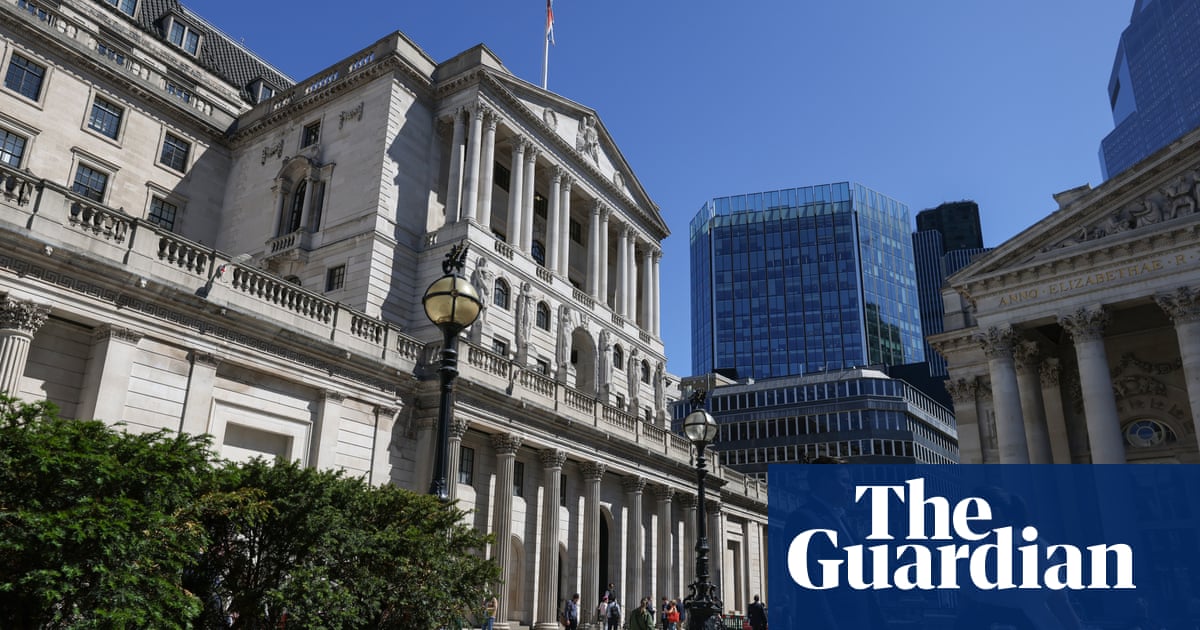Bank of England cuts interest rates by 0.25 points to 4.75%

The Bank of England has cut interest rates despite warning that Rachel Reeves’s budget will complicate its battle against high inflation by keeping the rate above its 2% target for a year longer than previously anticipated.
In a decision widely expected in financial markets, the Bank’s monetary policy committee (MPC) voted by a majority of eight to one to reduce the base rate from 5% to 4.75% to ease the pressure on households and businesses from high borrowing costs.
However, the central bank said the chancellor’s tax and spending plans would add to inflationary pressures even as they contributed to faster economic growth, in a development likely to be seized on by the government’s critics.
Casting its verdict on last week’s budget, the Bank said it expected the chancellor’s £70bn of additional spending backed by higher taxes and borrowing to add about 0.5 percentage points to headline inflation and 0.75% to gross domestic product (GDP).
It said the impact would be driven in part by Reeves’s plan to raise the rate of employer national insurance contributions (NICs) and the national living wage, in a development that led one member of the MPC – the external economist Catherine Mann – to push for interest rates to be held at 5%.
Andrew Bailey, the Bank’s governor, signalled that borrowing costs were still likely to come down in future, although cautioned against expectations for rapid action amid lingering concerns over above-target inflation becoming entrenched in the economy.
“We need to make sure inflation stays close to target, so we can’t cut interest rates too quickly or by too much. But if the economy evolves as we expect it’s likely that interest rates will continue to fall gradually from here,” he said.
Inflation fell back to 1.7% in September but the Bank has previously warned that the headline rate was on track to return above the target set by the government within months after an increase in the Ofgem energy price cap for households in Great Britain in October.
In its latest forecasts, the Bank said it expected inflation to peak at about 2.75% by the middle of next year and then remain above target in 2026, until falling back in 2027 – a full year longer than it had expected in its previous forecasts, published in August.
Reeves said the interest rate cut would be “welcome news” for millions of families but that households were still facing a challenge after Liz Truss’s mini-budget.
She said: “Today’s interest rate cut will be welcome news for millions of families, but I am under no illusion about the scale of the challenge facing households after the previous government’s mini-budget.
“This government’s first budget has set out how we are taking the long-term decisions to fix the foundations to deliver change by investing in the NHS and rebuilding Britain, while ensuring working people don’t face higher taxes in their payslips.”
after newsletter promotion
Analysts had warned Labour’s first budget in 14 years risked derailing progress towards lower rates by adding to inflationary pressures with higher government spending and borrowing.
Economists have also said that imposing tariffs on US imports – threatened by America’s new president-elect, Donald Trump – would stoke inflation, with consequences for the global economy. However, the US Federal Reserve is expected to cut rates by 0.25 points later on Thursday.
Threadneedle Street cut interest rates in August for the first time in four years, with a quarter-point reduction after a sharp decline in inflation this year. Bailey had signalled rates had further to fall when he told the Guardian last month that progress in the battle against inflation would allow the MPC to be more “aggressive”.
Around 800,000 fixed-rate mortgages with an interest rate of 3% or below are expected to be refinanced each year, on average, until the end of 2027.
Related
Why investing in women is a vital next step for…
Get Nadine White's Race Report newsletter for a fresh perspective on the week's newsGet our free newsletter from The Independent's Race CorrespondentGet our fre
Business secretary signals major shift on electric car policy to…
In a determined effort to retain Nissan’s manufacturing presence in Britain, Business Secretary Jonathan Reynolds has vowed to implement “substantial c
Joint Statement: Business Secretary and Fujitsu Services Ltd
Business and Trade Secretary Jonathan Reynolds today (Friday 7 March) met chiefs for Fujitsu in Tokyo to begin talks over the cost of redress for victims of th
UK foreign secretary backs multilateral defence funding for Europe
UK foreign secretary David Lammy has said that a new multilateral fund will be needed to secure Europe’s defence as he confirmed that Britain is “open to”













